Original Author: Filecoin Network
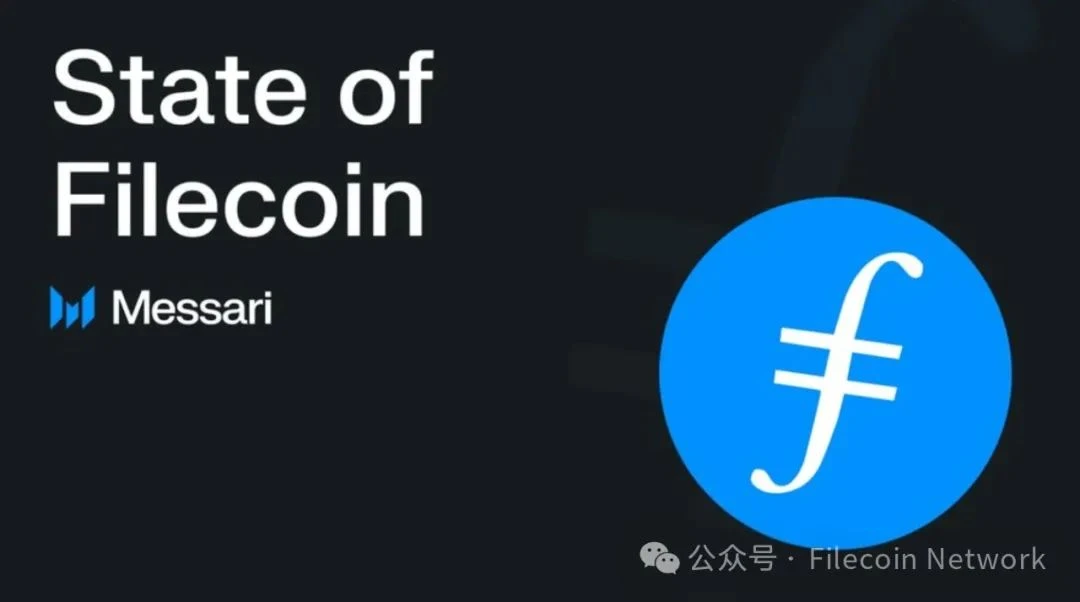
Main Points
In Q3, Filecoin's new storage transactions increased by 16% quarter-on-quarter, with storage utilization rising from 26% in Q2 to nearly 30% in Q3, while storage capacity decreased by 18% quarter-on-quarter.
By the end of Q3, over 2,000 users had stored datasets on Filecoin, with 518 users storing large datasets exceeding 1,000 TiB.
By the end of Q3, over 4,500 independent contracts had been deployed on the Filecoin Virtual Machine (FVM), with net deposits in DeFi on FVM exceeding 20 million FIL (approximately $84 million), primarily used for collateral, liquid staking, and DEX.
Filecoin continues to develop into a Decentralized Physical Infrastructure Network (DePIN), creating a decentralized storage market for enterprise adoption and supporting decentralized computing and artificial intelligence.
In Q3, the ecosystem expanded by launching the Filecoin Network Services (FWS) framework, providing a market for verifiable services for developers and users. To expand data solutions, Filecoin has established a series of partnerships in artificial intelligence.
Filecoin Basic Information
Filecoin is building a hardware market, with storage as its first service. Filecoin is built on IPFS (InterPlanetary File System) and prices storage based on a provider market rather than a fixed pricing structure. A storage transaction is akin to a contract with a Service Level Agreement (SLA)—users pay storage providers to store data for a specified period.
To ensure data security, Filecoin employs a cryptoeconomic incentive model that regularly verifies storage through zero-knowledge proofs. To incentivize storage providers to participate in storage transactions, Filecoin rewards them with the network's native token, FIL. If storage providers fail to provide reliable uptime or engage in malicious behavior against the network, they will face corresponding penalties.
To retrieve data, Filecoin users pay retrieval providers for data access. Unlike storage transactions that involve on-chain transactions, retrieval transactions use payment channels to settle off-chain payments, enabling faster retrieval. In addition to storage and retrieval, Filecoin aims to provide an open market where data can be run by contracting computing power, offering a more efficient alternative to traditional centralized systems.
Key protocol upgrades for implementing data computing services include smart contracts (Filecoin Virtual Machine - FVM) and scaling (Interstellar Consensus). Launched in March 2023, the Filecoin Virtual Machine introduces Ethereum-style smart contracts to Filecoin, facilitating new use cases in areas such as liquid staking, perpetual storage, and decentralized computing.
Related Links
Official Website | X (formerly Twitter) | Discord | Slack
Key Metrics
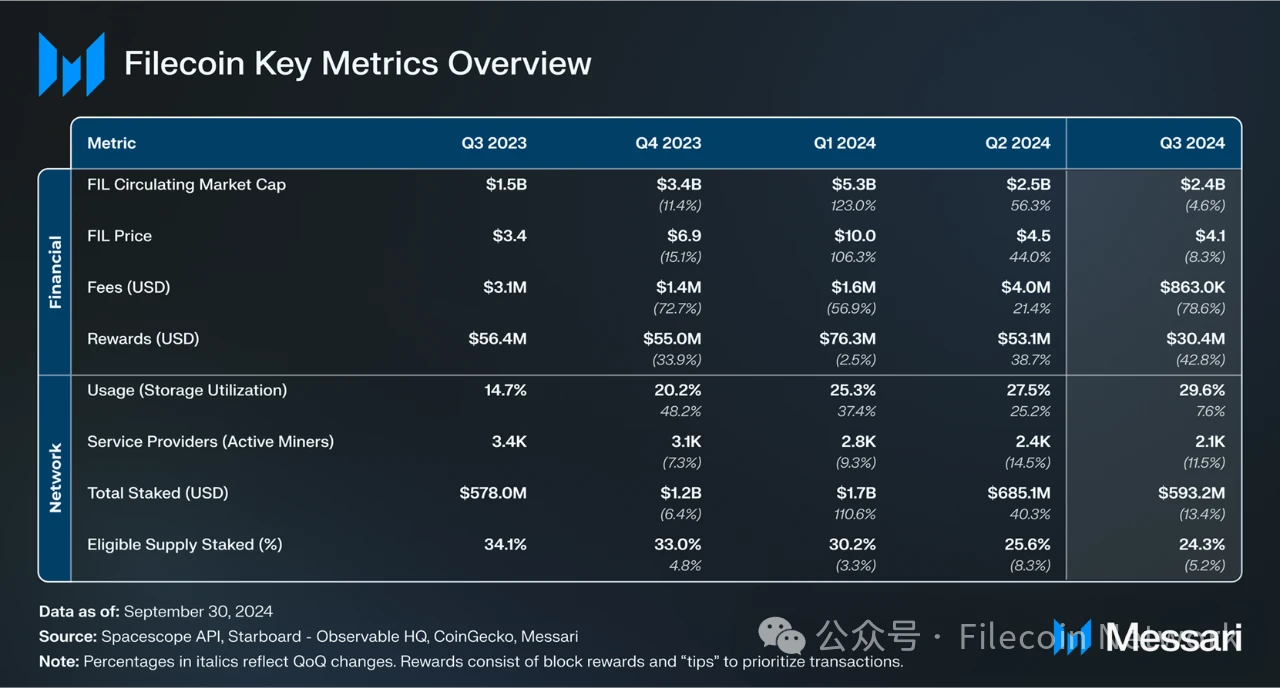
Performance Analysis
The Filecoin blockchain is used for decentralized data storage in the following ways:
Demand side, i.e., storage users needing data storage.
Supply side, i.e., storage providers with excess network capacity.
Network
The volume of data stored through active transactions between storage users and storage providers measures the demand for Filecoin storage.
Storage Transactions
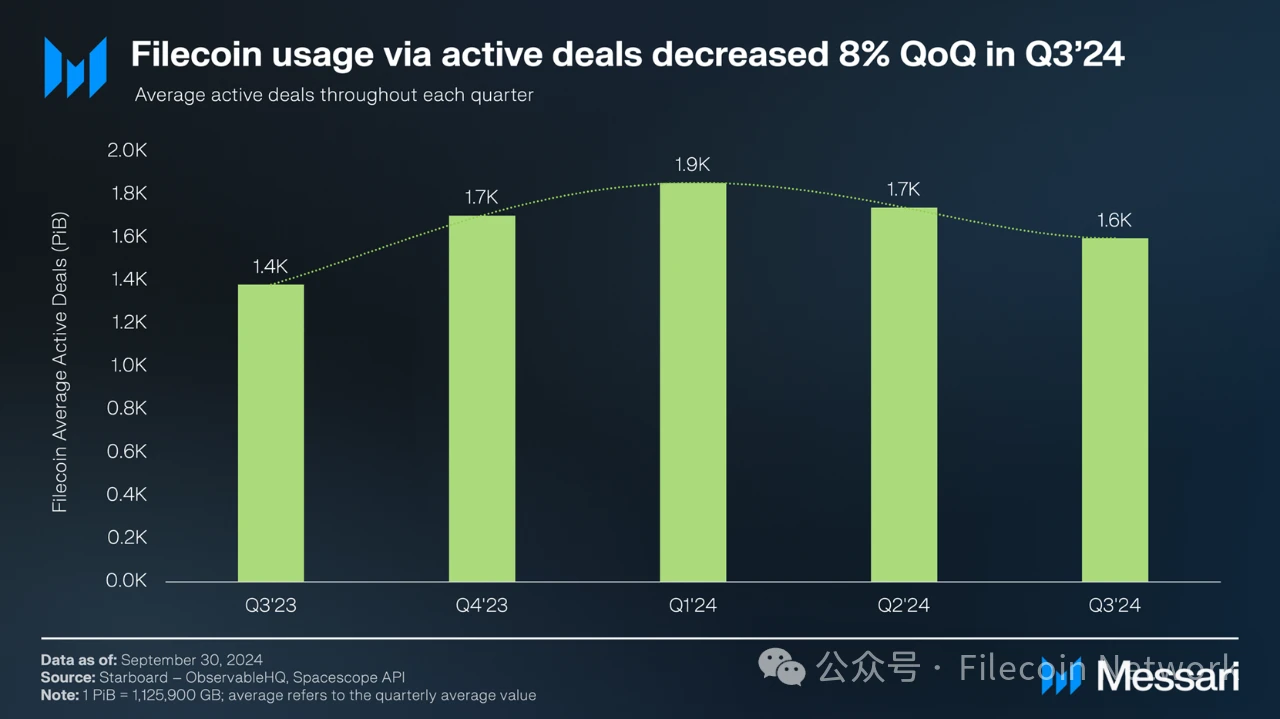
In Q3, the active transaction volume on the Filecoin network exceeded 1,600 PiB, a decrease of 8% quarter-on-quarter. Filecoin's current focus is on increasing enterprise adoption, launching new use cases around data services, including permanent archiving, data privacy, and integration with Web2 and Web3 applications.
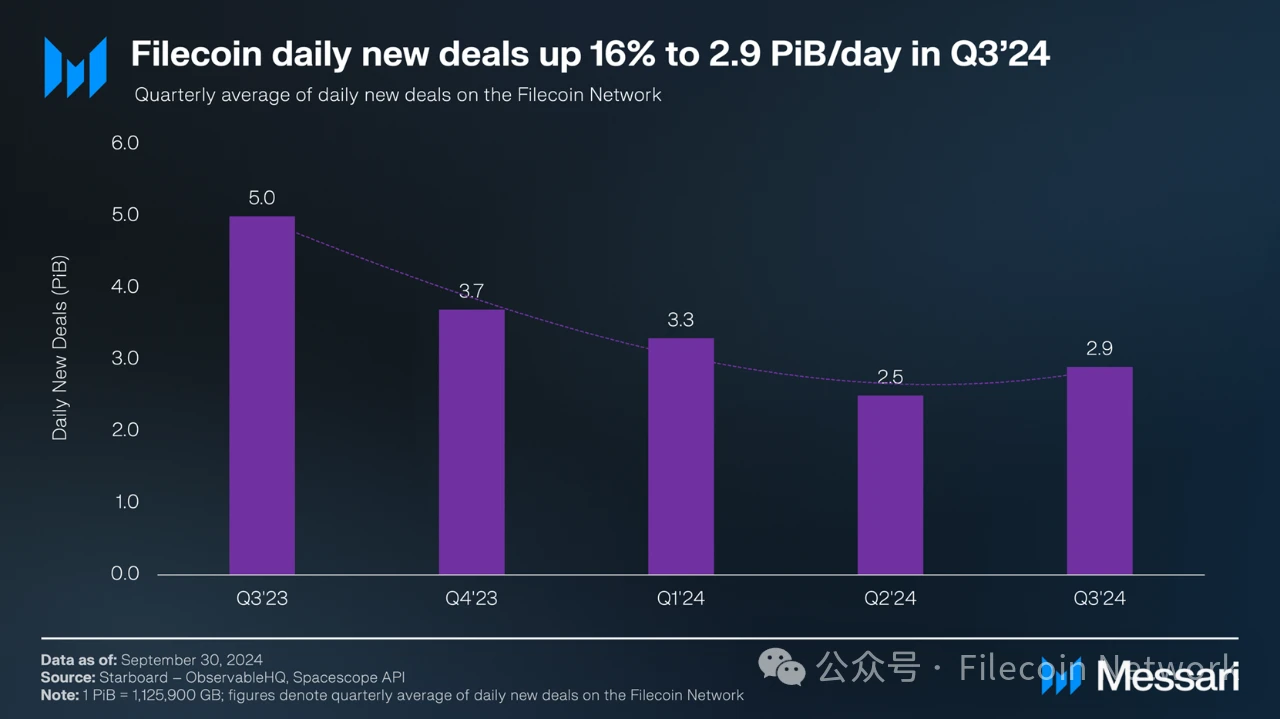
In Q3, the daily new transactions on the Filecoin network increased by 16% quarter-on-quarter, reaching 2.9 PiB/day. Given the 8% quarter-on-quarter decline in active transactions, the growth rate of new transaction volume currently exceeds that of expired transactions. Relative to the decreasing storage capacity, new transactions help enhance the utilization of the Filecoin network.
Storage Utilization and Capacity
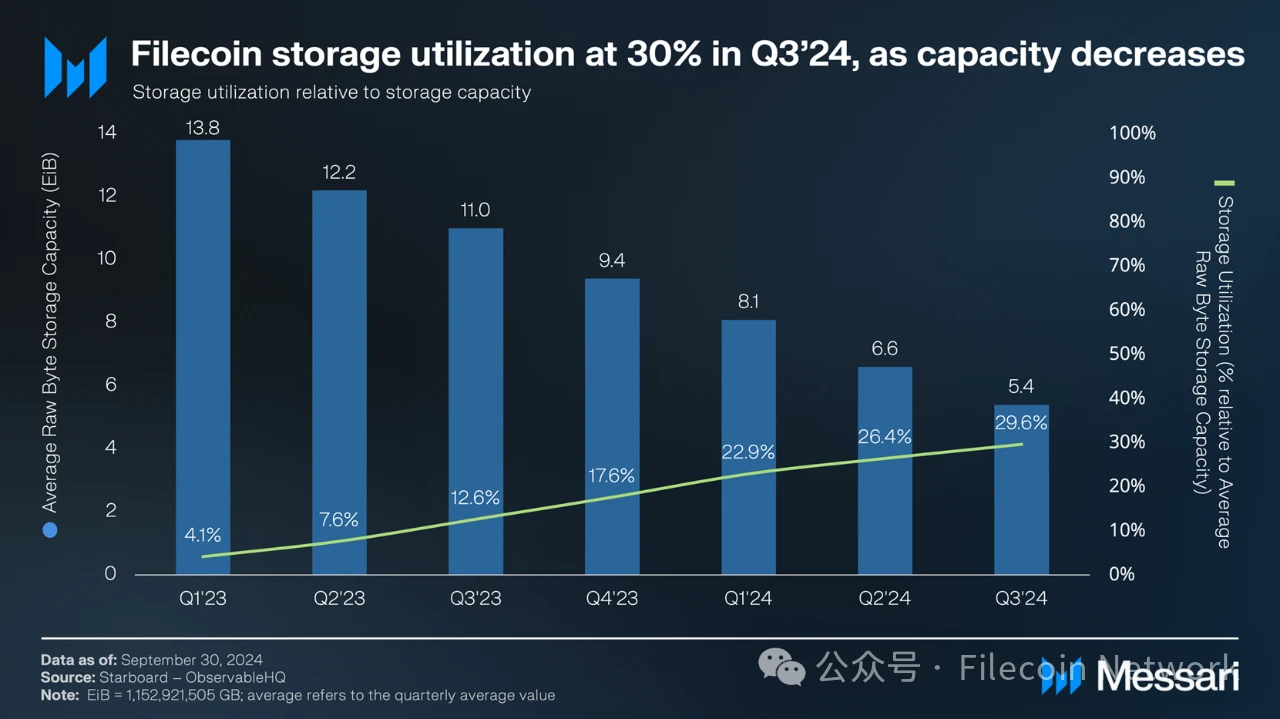
Filecoin's storage utilization relative to total available capacity increased to nearly 30% in Q3, up from 26% in Q2. While this growth is a positive signal for Filecoin's adoption through active storage transactions, it must be viewed in the context of network capacity.
Filecoin's average raw byte storage capacity decreased by 18% quarter-on-quarter in Q3, falling to 5.4 EiB. This metric has gradually declined since reaching a historical peak of nearly 17 EiB in Q2 and Q3 of 2022. The decline in storage capacity is further reflected in the decrease in the total number of storage providers. This metric, which peaked at over 4,100 in Q3 2022, fell to about 2,400 in Q2 2024.
Storage Users
The Messari Decentralized Storage Network Guide indicates that Filecoin is currently suitable for providing cold storage solutions (such as archiving and recovery) for enterprises and developers, with competitive pricing helping to attract traditional businesses seeking cost-effective alternatives for storing large volumes of archival data.
DeStor, a data storage provider on Filecoin, recently partnered with Qamcom DDS to enhance the security, robustness, and scalability of its storage services. Partners include data user endpoints like YayPal and Fieldstream, with YayPal being a Web3 game studio whose flagship game has over 500,000 users, and Fieldstream being an AI marketing analytics platform.
Other examples of user endpoint solutions include:
GhostDrive: Focused on prioritizing privacy and security through encryption, decentralization, and novel storage optimization techniques.
Seal: Focused on providing storage services to large users such as UC Berkeley, Starling Labs, and Atlas Experiment Network.
Steeldome: Focused on enterprise data archiving, backup, and recovery.
In addition to cold storage, other solutions are provided by companies such as Lighthouse, RIBS, retriv, and Flamenco.
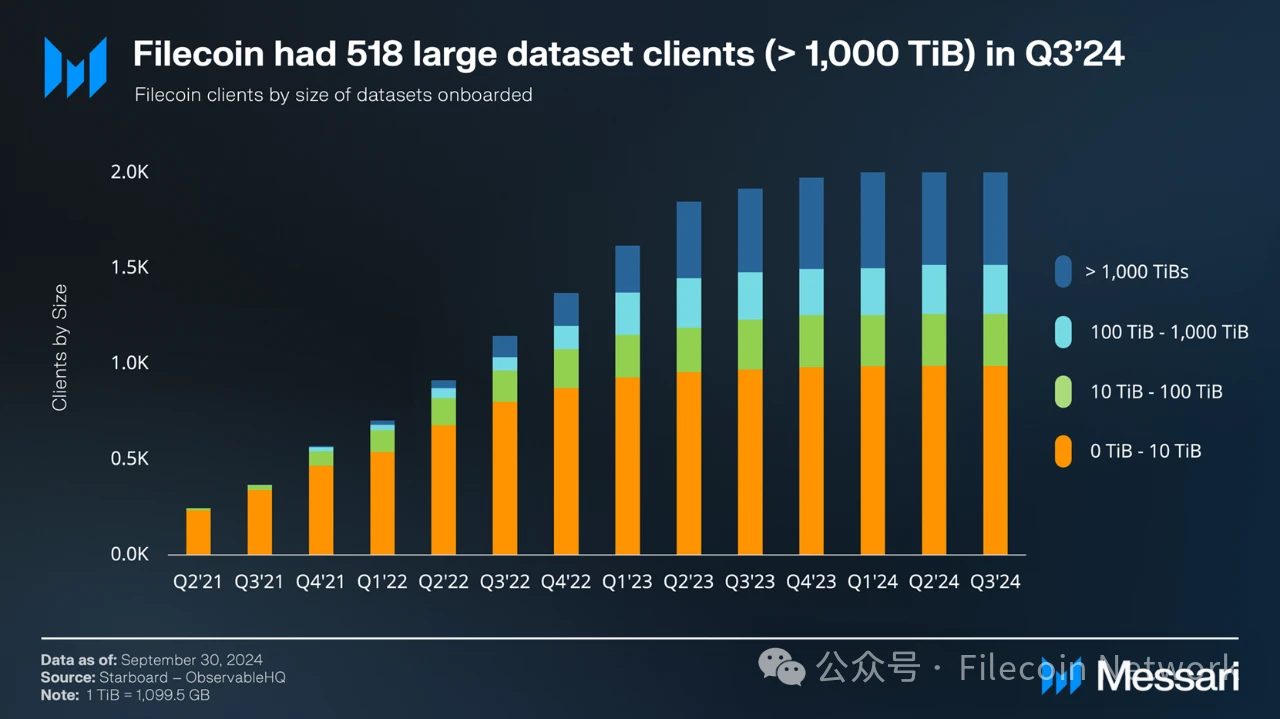
By the end of Q3, 2,034 users had stored datasets on Filecoin, with 518 users storing large datasets (i.e., datasets larger than 1,000 TiB). To encourage usage through active transactions, Filecoin offers various storage services, including CID Gravity, Titan storage, and Decentrally.
According to statistics from the Filecoin Client Explorer, major users include Starling Lab, NFT platform OpenSea, and Layer-1 network Solana.
Other notable institutions utilizing the Filecoin network include:
Victor Chang Cardiac Research Institute maintaining and sharing research data
Democracy’s Library storing datasets collected by the Internet Archive at the end of management
SETI Institute using Filecoin to store astronomical research data
UC Berkeley collaborating with Seal Storage for physical research storage
GenRAIT using Estuary to store critical genomic data on Filecoin
Research center Starling Lab storing sensitive digital records of human history
Ewesion (China's fastest-growing graphic file host) using Filecoin for data storage
DeSci Labs using decentralized data storage on Filecoin to enable research to be replicated and independently verified by other researchers
Opscientia (OpSci) facilitating easier data sharing for scientists worldwide through the use of Filecoin.
Destor and Seal Storage collaborating with Cyber SMART on an AI data integrity improvement research project, funded by the National Science Foundation and industry members in a university-industry cooperative organization.
An overview of Filecoin's featured users can be viewed here.
Retrieval
To meet the demand for hot storage use cases, an increasing number of Layer 2 solutions and protocols are being built on top of Filecoin and IPFS. Examples include:
Basin: Focused on decentralized AI/ML.
Akave: Providing on-chain data lakes for decentralized AI.
Storacha: Previously a web3 storage solution, now focused on DePIN Gaming.
As a content delivery network (CDN) for Filecoin and IPFS, the Saturn project has completed closed testing. This project has integrated with Web3.Storage and will build its hot storage layer as part of the Storacha network, aiming to create a combined product and network for fast storage and retrieval. Meanwhile, tools like the Station application will bring decentralized retrieval capabilities to desktops, while the SPARK and Voyager modules allow for retrieval checks on the network. Specifically, Station utilizes idle computing resources and offers FIL rewards.
FVM Usage
The Filecoin Virtual Machine (FVM) was launched in Q1 2023, bringing Ethereum-style smart contracts to Filecoin. By the end of Q3, over 4,500 independent contracts had been deployed on FVM, facilitating over 3 million transactions.
Token staking and leasing activities are expected to continue growing, as the DeFi protocol GLIF, which drives a significant amount of FVM activity, offers users a new way to participate and earn GLIF points through "quests." These quests are designed to promote community-driven activities, including social media interactions and partner project collaborations, such as the first quest on Galxe or partner tasks. As of November 25, 2024, over 82 million GLIF points distributed to GLIF users will be exchanged for GLIF tokens on a one-to-one basis in Q4.
Decentralized lending is another growth area for FVM. The FILLiquid lending platform allows FIL token holders to earn interest on deposits and provides loans to storage providers (SPs). After surpassing 20,000 independent wallets during the test network phase, the platform launched FIG staking, a new product that allows users to earn rewards by staking the platform's governance token, FIG.
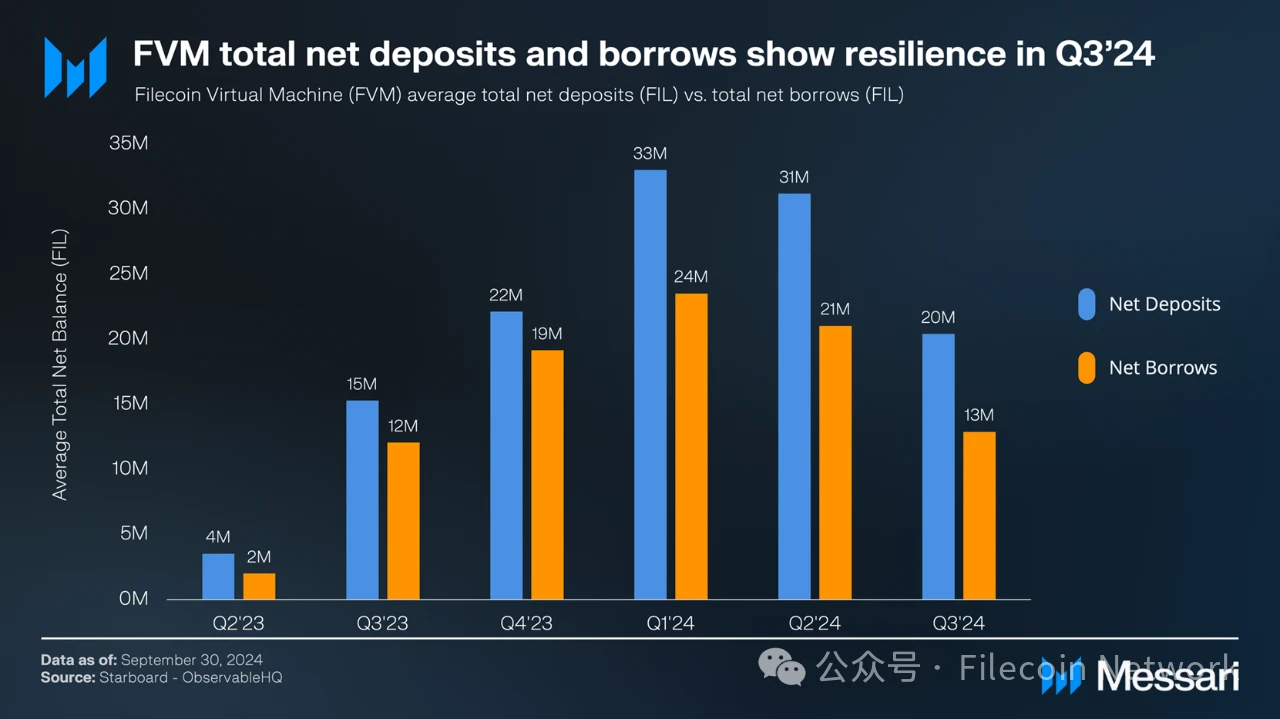
According to FVM Explorer statistics, the average net deposits in DeFi on FVM in Q3 exceeded 20 million FIL (approximately $8.4 million), primarily used for staking, liquid staking, and DEX. Among these, the liquid staking protocol GLIF accounted for the majority (62% as of the end of Q3), followed by SFT protocol (10%), FilFi (10%), and others (16%).
Meanwhile, according to the FVM DeFi leaderboard, the average net borrowing amount in DeFi for Q3 was 13 million FIL (approximately $5.3 million). Driven by the overall risk-averse market environment, both deposits and borrowings showed resilience in Q3.
Financial Aspects
The revenue framework of Filecoin is similar to that of Ethereum, as its gas system is designed based on the EIP-1559 mechanism. This gas system consists of network fees, compensating for the resources used by burning network fees. Both storage users and storage providers generate protocol revenue.
Revenue
According to Messari's revenue analysis, Filecoin's protocol revenue includes the following four components:
Base fees — dependent on message congestion, required for any storage proof.
Batch fees — used when batch packaging storage proofs.
Overestimation fees — used to optimize gas usage.
Penalty fees — imposed when storage providers fail.
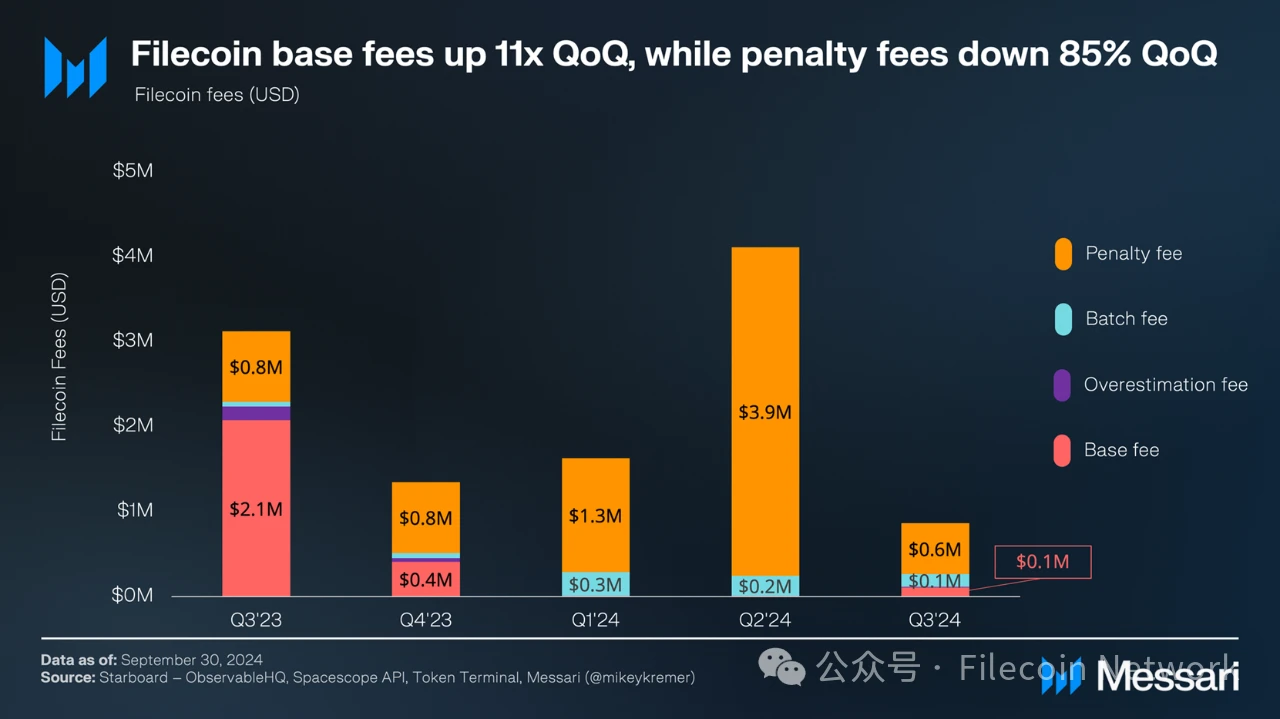
Filecoin's base fees increased 11-fold quarter-on-quarter, reaching nearly $110,000. Meanwhile, penalty fees decreased by 85% quarter-on-quarter, falling to $600,000, the lowest value in the past five quarters. This development indicates an improvement in the reliability of storage providers' services.
Rewards
Filecoin rewards include:
Block rewards distributed to storage providers by the network.
"Tips" fees used to accelerate transactions.
In Q2, block rewards constituted over 99.9% of supply-side revenue, while "tips" accounted for a small portion. The new FIL token minting mechanism relies on the following two models:
Exponential decay model (30% of total): To encourage participation, block rewards are highest in the early stages. Over time, they exhibit exponential decay.
Baseline model (70% of total): Block rewards are allocated as storage capacity increases.
The combination of these two models helps maintain participation after the early distribution phase of block rewards ends (see exponential decay model) and continues to reward the additional value brought to the network by the increase in storage capacity (see baseline model).
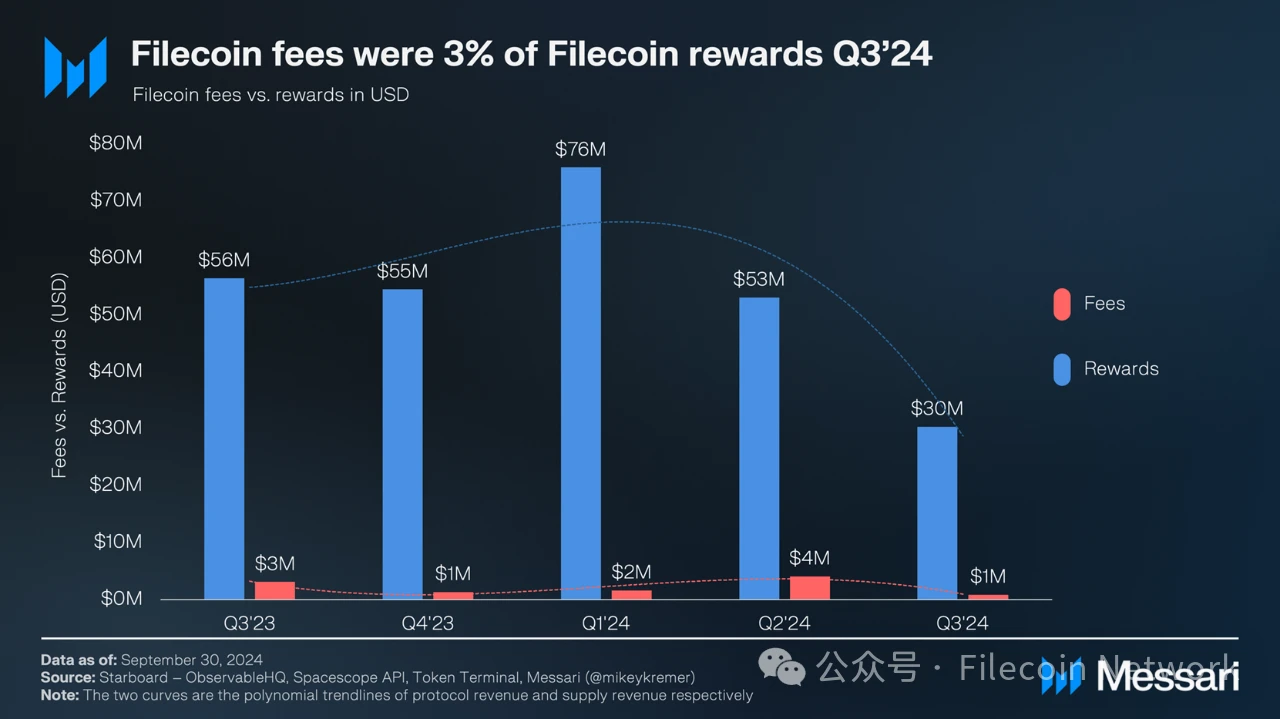
Due to the decline in the FIL/USD price, supply-side rewards fell from $53 million in Q2 to $30 million in Q3, a decrease of 30%. In terms of FIL, rewards dropped from 9 million FIL in Q2 to 7.8 million FIL in Q3, a decrease of 15%. In the coming quarters, FIL reward issuance may continue to decrease. For an in-depth discussion on future FIL issuance and various simulations, please refer to Messari's recent study on FIL circulating supply.
Ecosystem Overview
As of September 2024, the Filecoin Ecosystem Explorer has recorded over 180 known projects, which is a non-exhaustive database of community network projects. While the activity in the Filecoin ecosystem has historically focused on data storage, its expansion in Q3 and integration with artificial intelligence aim to provide infrastructure for applications in decentralized AI, data management and analysis, gaming, and communication.
Data Management and Analysis
Projects like Lighthouse and Destra leverage Filecoin to provide one-time payment permanent data storage. Triton One has completed the initial phase of the Old Faithful project, providing the Solana ledger's historical records to the community. Seal Storage offers immutable data solutions to meet the needs of enterprises and individuals seeking secure, long-term storage. Cryptosat uses micro-satellites to achieve secure verifiability, aiming to enhance data collection and verification based in space.
In decentralized computing, Basin supports platforms like Tableland and WeatherXM through data-intensive analysis and operations. Akave supports the creation of on-chain data lakes.
Other projects providing data services on Filecoin include:
Fluence: Enabling developers to scale their Web3 projects.
Storacha: A decentralized hot storage network focused on DePIN Gaming.
Ramo Network: Monetizing idle computing power.
Bagel: GPU reconstruction and AI infrastructure.
IoTeX: Open modular infrastructure for DePIN.
Artificial Intelligence and Machine Learning
A key development in integrating Filecoin with artificial intelligence and machine learning applications is the collaboration with SingularityNET. This partnership focuses on protecting metadata through Lighthouse, aiming to ensure verifiable model training and promote ethical AI practices.
Another significant development is the collaboration with Theoriq AI to develop AI agents for analyzing decrypted CIA datasets. This project aims to enable efficient research on over a million documents, combining AI with decentralized storage for complex data analysis. The outcome of this collaboration is the Filecoin AI agent, which is trained on Filecoin documents and GitHub repositories.
At the same time, Filecoin integrates with Eternal AI for model storage, EQTY Lab uses IPFS and Filecoin to verify AI model lineage, Bagel Network provides GPU markets and AI infrastructure, Aethir and Ramo Network monetize idle computing power, while Nuklai Data offers a collaborative ecosystem for private data networks.
Consumers
The gaming industry is also utilizing Filecoin's capabilities. OP Games provides NFT minting services for games, Fluence helps developers scale Web3 projects, and the Storacha Network focuses on decentralized hot storage for DePIN gaming. File Market creates Web3 stores and marketplaces.
Decentralized Communication
Huddle01 provides decentralized video conferencing solutions using Filecoin's infrastructure, meeting the demand for secure and private communication platforms.
Qualitative Analysis
Key Developments
Key technological advancements achieved in Q3 include protocol upgrades, new services, and software improvements that enhance Filecoin's capabilities in decentralized storage and computing.
Filecoin Waffle Upgrade
The Filecoin Waffle upgrade was released on August 6, 2024, introducing improvements to network efficiency, security, and core infrastructure. The Waffle upgrade integrates six Filecoin Improvement Proposals (FIPs) that address specific aspects of network functionality. Notable among them are:
FIP-0065 simplifies the calculation of network circulating supply by excluding locked balances of built-in market Actors, preparing for direct data commitments without market transactions.
FIP-0079 implements BLS aggregate signatures in FVM, which may improve the verification efficiency of smart contract interactions.
FIP-0092 introduces a non-interactive PoRep (NI-PoRep) protocol in this upgrade, representing a change in the Filecoin proof system that may lower the entry barrier for new storage providers and enhance network efficiency.
Filecoin Fast Finality (F3)
Following the Waffle upgrade, Filecoin has released the Filecoin Fast Finality upgrade, aimed at reducing transaction completion time to under one minute, addressing the limitations of Filecoin's previous consensus mechanism. F3 will be implemented in two phases:
The first phase introduces the Easy Finality Calculator, which reduces finalization time to approximately 15 minutes using existing data without changing the protocol.
The second phase aims to provide finality within one minute through verifiable certificates.
F3 integrates a new consensus protocol designed to accelerate finalization times. This hybrid approach combines finality gadgets with BFT protocols, focusing on improving speed, security, and enhancing resilience against various attacks.
For developers, F3 enables the creation of faster applications. Exchanges can benefit from quicker transaction confirmations, thereby increasing trading efficiency. Bridge builders can operate with trustless and low-cost operations.
Filecoin Network Services (FWS)
At the 2024 Brussels Summit, Filecoin announced the launch of Filecoin Network Services (FWS), expanding its products beyond decentralized storage to create a composable framework for protocols built on decentralized cloud.
The goal is to simplify services like unified billing and encourage the reuse of storage primitives. These features focus on lowering the entry barrier for developers, increasing network revenue, and improving overall network functionality. For developers, this may facilitate easier access to decentralized services, potentially enabling the creation of more complex decentralized applications. For users, interacting with Filecoin-based services can provide a more seamless experience.
Lotus Software Updates
In Q3, the Lotus software, which implements the Filecoin network, underwent multiple updates focusing on enhancing network functionality, improving Ethereum compatibility, and addressing performance and security issues. Key updates include:
Lotus V1.27.2 (July 17, 2024) introduced improvements to RPC methods and upgraded libp2p to V0.35.3.
Lotus V1.28.1 (July 25, 2024) implemented the Filecoin Waffle upgrade, including support for traditional Ethereum transactions (FIP-0091).
Lotus V1.28.2 (August 15, 2024) fixed a critical issue causing excessive bandwidth usage and improved F3 performance enhancements.
Lotus V1.29.0 (September 2, 2024) enhanced Ethereum RPC functionality.
These updates represent changes in Filecoin's technical capabilities, enhancing its interoperability with Ethereum-based tools. On September 16, the Filecoin network reported an outage due to "beacon validation failure," which prevented many Filecoin nodes from syncing. Following the incident, Lotus patches V1.28.3 and v1.29.1 were released, and affected nodes have been restored, while Filecoin continues to monitor the network.
Important Events
Joining Grayscale's Decentralized AI Fund
With Grayscale launching its Decentralized AI Fund on July 17, 2024, Filecoin's institutional visibility has been enhanced. The fund targets qualified investors and includes Filecoin (FIL) as well as other prominent projects in the decentralized AI space. As of October 25, FIL accounted for 17% of the fund's composition.
The Decentralized AI Fund launched by Grayscale Investments focuses on AI-centric cryptocurrency and blockchain projects for qualified investors. The fund represents market recognition of Filecoin's role in decentralized AI infrastructure.
Developer Summit and Events
The 2024 Filecoin Developer Summit was held in Brussels in July 2024, exploring the evolution of the Filecoin protocol beyond its core data storage functionality and highlighting potential expansions of network capabilities. Key focus areas included:
The Filecoin Protocol Evolution track, which examined the latest developments, upcoming features, and the long-term vision for the network.
A dedicated security conference aimed at enhancing network resilience.
Key Governance Decisions
Filecoin's governance model continued to evolve in Q3, with several developments aimed at enhancing decentralization and community participation in the decision-making process.
Community Roadmap
During the 2024 Filecoin Developer Summit, a community roadmap meeting brought together participants from diverse backgrounds to collaboratively update the community roadmap. The collected community feedback will be incorporated into Filecoin's future development roadmap.
Evolution of the Fil+ Program
The Fil+ program is continuously evolving, with over 50 active allocators committed to DataCap updates. This development indicates that Filecoin is working to refine its governance structure, particularly in managing and allocating network resources.
Summary
In Q3 of this year, new storage transactions on Filecoin increased by 16% quarter-on-quarter. Storage utilization rose from 26% in Q2 to nearly 30% in Q3, while storage capacity decreased by 18% quarter-on-quarter. By the end of Q3, over 2,000 users had stored data on Filecoin, with 518 users storing large datasets exceeding 1,000 TiB. Over 4,500 independent contracts have been deployed on the Filecoin Virtual Machine (FVM). Net deposits in DeFi on FVM exceeded 20 million FIL (approximately $84 million), primarily used for collateral, liquid staking, and DEX.
Filecoin continues to develop as a decentralized physical infrastructure network (DePIN), creating a decentralized storage market for enterprise adoption and enabling decentralized computing and AI. The ecosystem expanded in Q3 with the release of the Filecoin Network Services (FWS) framework, providing a marketplace for verifiable services for developers and users. Additionally, Filecoin established a series of partnerships in AI to expand data solutions. Furthermore, Filecoin implemented the Waffle upgrade and announced Filecoin Fast Finality (F3), addressing challenges related to scalability and efficiency.
If you would like to let us know what you liked about this report, what was missing, and any other thoughts, please fill out this short form. All feedback is subject to our privacy policy and terms of service.
This report was commissioned by the Filecoin Foundation, and all content is produced independently by the authors and does not necessarily represent the views of Messari, Inc. or the organization that commissioned the report. The commissioning party does not influence editorial decisions or content. The authors may hold the crypto assets mentioned in this report. This report is for informational purposes only and is not investment advice. You should conduct your own research and consult independent financial, tax, or legal advisors before making any investment decisions. Past performance of any asset does not guarantee future performance. Please see our Terms of Service for more information.
No part of this report may be reproduced, photocopied, reproduced, or distributed in any form without the prior written consent of Messari®.
免责声明:本文章仅代表作者个人观点,不代表本平台的立场和观点。本文章仅供信息分享,不构成对任何人的任何投资建议。用户与作者之间的任何争议,与本平台无关。如网页中刊载的文章或图片涉及侵权,请提供相关的权利证明和身份证明发送邮件到support@aicoin.com,本平台相关工作人员将会进行核查。



